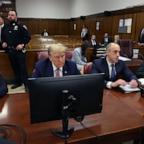Supreme Court hears religious-workplace firing dispute
WASHINGTON -- The Supreme Court struggled Wednesday with a case fundamental to the separation of church and state, testing when people who work for religious organizations can sue for job discrimination.
A Michigan teacher diagnosed with narcolepsy but eventually cleared to work sued under the Americans with Disabilities Act when a Lutheran school fired her.
The Hosanna-Tabor Evangelical Lutheran Church said Cheryl Perich violated a core church principle by bringing her grievance to the federal Equal Employment Opportunity Commission (EEOC) rather than using church processes to try to get her job back. Hosanna-Tabor is asking the justices to throw out the case, based on a so-called "ministerial exception," which bars some job-related lawsuits against religious organizations and is intended to protect churches from government interference. A lower U.S. appeals court had ruled for Perich.
The appeals court rejected Hosanna-Tabor's "ministerial exception" defense, noting that Perich's job as a fourth-grade teacher was mostly secular. She taught math, social studies, music and other subjects, along with religion.
In his appeal on behalf of Hosanna-Tabor, University of Virginia law professor Douglas Laycock told the justices, "Churches do not set the criteria for selecting or removing the officers of government, and government does not set the criteria for selecting and removing officers of the church."
He urged the justices to rule that any employee who is a commissioned minister or who teaches religion, irrespective of other duties, is a "minister" and barred from suing. In his written filing, Laycock asserted that while judges have long recognized a "ministerial exception" in employment litigation, determining who is covered has been difficult.
"They agree that it extends beyond pastors, priests, and rabbis, but not as far as janitors or secretaries," he said. "The question is where to draw the line."
Of Perich, Laycock said that not only did she offer religion classes, she also had been a "called" teacher with ministerial responsibility. "The fact that she's a commissioned minister is the clincher in this case," he said.
Assistant U.S. Solicitor General Leondra Kruger, representing the EEOC, urged the justices to consider the case more strictly as an employee-employer dispute, without special consideration because a church is involved.
Arguing separately on behalf of Perich, Walter Dellinger said any ministerial exception should be read narrowly. He told the justices that in most lower courts, it has not applied to teachers.
The justices appeared to be frustrated with the arguments of all three lawyers and searching for some ground between extremes. There was no shortage of examples of the potential scope of the case, however.
Justice Sonia Sotomayor, for example, wondered about a teacher who reported child sexual abuse to the government and was fired because of the report.
Laycock said that was "a difficult case" and that an exception to his rule might arise when the safety of children was at issue.
Justice Anthony Kennedy, often a crucial vote on the most contentious cases, homed in the fact that Perich was claiming retaliation under disabilities law and "can't even get a hearing."
"You're asking for an exemption so these cases can't even be tried," Kennedy told Laycock.




